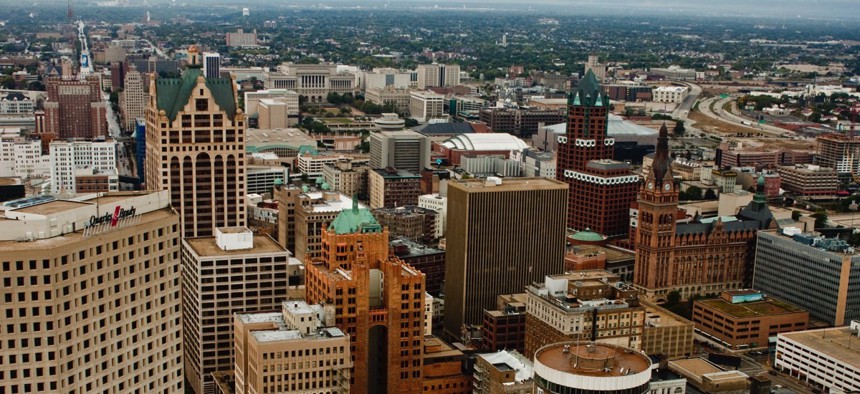Is Keeping an NBA Team in Milwaukee Worth Taxpayers’ Money?

Milwaukee, Wisconsin Erik Aldrich / Flickr.com
Gov. Scott Walker plans to sign a bill Wednesday that will commit millions of dollars in state and local public funding to a basketball arena project. But some officials still aren’t sold on the deal.
A deal that will dedicate hundreds of millions of dollars in public money to building a new basketball arena for the Milwaukee Bucks is set to move one step closer toward completion Wednesday.
That’s when Wisconsin Gov. Scott Walker plans to sign a bill authorizing the arena financing plan, which is set to involve more than $400 million in state and local funds after accounting for interest costs.
If the arena goes unbuilt, it’s likely the Bucks will end up relocating to another city. The governor has said that the team’s departure would cost Wisconsin more in lost tax revenue than the state stands to spend on the new facility.
“This plan protects taxpayers from the loss of current and future tax revenue generated by the Bucks and visiting teams and supports a new arena without tax increases or state bonding,” Walker’s press secretary, Laurel Patrick, said in an email last Thursday.
There are some indications that the tax revenue the Bucks and the National Basketball Association generate for Wisconsin could outweigh the money the state itself spends on the arena.
But for local governments that will also bear millions of dollars of the project’s costs, the financial calculus is less clear cut.
Milwaukee County Executive Chris Abele , a Democrat and a key player in the talks that led to the deal, believes that the arena will provide a boost for the local economy—spurring real estate development and jobs. “Even before this deal was signed we were getting more calls from in-state and out-state developers wanting to lock up land,” he said in an interview last Friday.
In contrast, city of Milwaukee Common Council Alderman Nik Kovac is a skeptic. The Finance and Personnel Committee chairman sees the money the city will spend as a giveaway, one that will direct funds that could be spent on core services toward a lucrative sports franchise.
“The more I learn about it, the more cynical I get about what the taxpayers are going to get in return,” he told Route Fifty last week.
Meanwhile, the Wisconsin Center District , a municipal entity that will issue the bulk of the public bonds for the project, had over $234 million of debt already outstanding as of Jan. 1, 2014 .
Franklyn M. Gimbel has been on the district’s board of directors for about two decades and is currently the chairman. He said that the arena plan should be financially manageable for the district but that it will make it difficult to also pay for a long-planned expansion of a downtown convention center, which he said is also economically important for Milwaukee.
“If they would have done an overall 1 percent sales tax in Milwaukee County, that would have generated enough money to take care of the public financing portion of the arena, and it would have allowed us to expand the convention center,” he said. “But that wasn’t ever on the table because the crying call of Grover Norquist and his followers is that ‘we don’t raise taxes,’ and that’s the Scott Walker mantra, too.”
Norquist is president of Americans for Tax Reform , a group that organizes a pledge politicians can sign agreeing to oppose tax increases. Walker has signed the pledge, according to a database the group maintains.
Gimbel’s 20 years of involvement in the district are most likely about to end. When Walker signs the arena legislation on Wednesday, the current district board will be dissolved.
Even among legislators who backed the deal, some say they would prefer that public dollars not be pumped into a professional sports facility. But they contend that there is no other option if Wisconsin is to prevent the Bucks from decamping to another state.
“I agree that this should all be private dollars,” said Rep. Joe Sanfelippo , a Republican in the Wisconsin Assembly who voted for the final version of the arena legislation. But he added: “We have to play the hand we’re dealt, and you have other cities that are out there willing to pony up money and even more money than what we’ve ponied up from the state’s perspective.”
“Sometimes we don’t like the rules of the game,” he continued. “But we don’t set those rules.”

The Deal
To understand the arena deal, it helps to know a few details about the recent sale of the Milwaukee Bucks .
Herb Kohl , a former Democratic U.S. senator from Wisconsin, owned the team from 1985 until last year when he agreed to sell the franchise to billionaire investors Marc Lasry and Wesley Edens for about $550 million. Opened in the late 1980s, the Bucks’ current home court, the BMO Harris Bradley Center , is aging and somewhat humble compared to flashier new sports facilities.
Part of the sale agreement for the team was a stipulation that the Bucks had to have a new arena finished, or moving toward completion, by 2017. If they did not, the NBA would be able to purchase the Bucks from the new owners for $575 million.
This would have almost certainly resulted in the team getting relocated to a more lucrative media market—possibly Las Vegas or Seattle.
To help keep the Bucks in his hometown, Kohl agreed to put $100 million toward the new arena . Lasry and Edens said they would invest another $150 million. But arenas are expensive, and that money is only about half of the facility’s estimated $500 million price tag.
Enter Scott Walker. Last January , the governor, who is now also a contender for the 2016 Republican presidential nomination, unveiled a proposal to use public money to help get the arena built. The so-called “Pay Their Way” plan involved issuing about $220 million in bonds, just shy of half the money needed for the project, and then paying the debt off using the growth from state tax revenue generated by the Bucks and the NBA.
The response in the legislature was cool. Republican Assembly Speaker Robin Vos quickly made it clear that the chances of Walker’s proposal gaining approval were slim if local governments did not cover some of the cost. Negotiations and legislative wrangling ensued.
The end result was a bill that calls for $250 million to come from four public sources: the state of Wisconsin, the Wisconsin Center District, Milwaukee County and the city of Milwaukee.

Debt and Borrowing Costs Could Exceed $377 million
Central to the arena deal is the Wisconsin Center District, which is poised to issue $203 million of debt to help fund the project.
The district operates a downtown convention space called Wisconsin Center , as well as a theater , and an arena built in 1950, which provides a home for the University of Wisconsin-Milwaukee Panthers basketball team. Formed in 1994 to build and operate the convention center, the district is allowed to issue bonds and to receive tax revenue.
The current taxes it collects are levied on hotel rooms, car rentals and food and beverage sales at restaurants and bars. These tax revenues totalled about $29.8 million in 2014, according to the district’s most recent financial statement.
From a political standpoint, these taxes are a crucial part of the deal. They provide a way to funnel public dollars to the arena project without creating new taxes or raising existing ones.
But the financing plan involves more than the district issuing and paying back the debt on its own. A July 2 memo from Wisconsin’s Legislative Fiscal Bureau breaks down the details.
Of the $203 million of bonds the district issues, $55 million would be supported by the state through the annual appropriation of $4 million in general purpose revenue .
Another $55 million, or $4 million annually, is Milwaukee County’s responsibility. An earlier version of the bill called for the state to collect delinquent property tax and court debts on the county’s behalf to raise this money, but that language was later axed . Instead, the state will withhold $4 million in municipal aid from the county each year.
So between the state and the county that’s $110 million, which leaves $93 million the district will need to repay using its existing taxes.
But there are also interest costs. Factor these in and the overall state and county contributions each rise to $80 million, based on estimates included in the Legislative Fiscal Bureau memo. The district, meanwhile, ends up on the hook for a projected $217,250,000.
Including interest, the total estimated cost for the bonds the Wisconsin Center District will issue checks in at around $377,250,000.
In order to allow the district to pay down its existing bonds, the new debt would likely be issued in the form of zero coupon bonds , enabling payments to be pushed years into the future. Typically, with a zero coupon bond, the borrower does not make regular payments over the lifespan of the debt. Instead, they make one lump payment for the principal and interest at the end of its term.
Michael Belsky , a former managing director of the public finance group at Fitch Ratings, and a lecturer and fellow at the University of Chicago’s Harris School of Public Policy, said it’s difficult to generalize about whether zero coupon bonds are more expensive than other types of debt for borrowers. “It’s hard to say,” he said. “It really depends on the interest rate.”
To help defray costs for the state and the district a $2 dollar ticket surcharge for arena events is also written into the legislation. The state would get 25 percent of the money and the district 75 percent. The surcharge is expected to produce about $2 million annually, according to a July 16 memo from the Legislative Fiscal Bureau.
The city of Milwaukee’s role in the deal involves providing $35 million in financing for a new parking structure and $12 million in bonds for what’s known as tax increment financing district. With tax increment financing, a municipality typically injects public money into a development project up front and then pays off that investment with the growth in tax collections from improved property. All told, the city is slated to spend about $47 million, not including interest.
Cheaper to Keep Them?
As he made a case for putting public money toward the arena deal earlier this year, Walker coined a motto to promote the investment: “ Cheaper to Keep Them .”
Providing a foundation for Walker’s assertion is Wisconsin’s “ jock tax .” This is an income tax that applies to NBA players and other team employees, which is levied on both in-state and out-of-state residents. Non-residents pay based on their number of “duty days” in the state, which include not only game days but also activities like practices and meetings.
The state collected about $6 million in NBA income tax withholdings from the Bucks and visiting teams in both 2012 and 2013, according to figures provided this week by the Wisconsin Department of Revenue .
Based on publicly available information about future television contacts, media deals and the recently announced increase in the NBA salary cap, the department concluded that these revenues will rise continuously during the coming decades.
By 2020, they predict that the withheld jock tax collections will total around $11 million. By 2040, $34 million.
“Our assumptions regarding future tax revenue growth from NBA players are conservative, yet reasonable,” said Stephanie Marquis, communications director for the Wisconsin Department of Revenue, in an email on Monday. She also pointed out: “The NBA salary cap has increased 11 percent, to a record $70 million. That is nearly $5 million ahead of our estimates.”
Walker’s office has said that, over 20 years, the arena plan will prevent the loss of $299 million in income tax revenue from NBA teams while capping the state’s contribution at $80 million.
“Our plan is the result of a state and local, public and private alliance,” Walker said in a June statement, “and it is developed with the goal of ensuring a good return to our state taxpayers.”
“We’re clearly going to be losing money”
Nik Kovac acknowledges that it might make sense from the state’s perspective to preserve the NBA tax revenue, but for the city he’s not sure the deal adds up.
“We have an 800-space parking garage,” the Milwaukee alderman said. “They want us to tear that down and build a 1,000-spot garage basically around the corner.”
Kovac explained that the current parking facility is paid off and the city collects all of its revenue. Under the deal, the Bucks and the city would share the income from the new garage. “Their offer is we can spend $35 million so they can split that revenue with us,” he said.
Asked if there were other ways the city could spend that money, Kovac rattled off a number of basic city expenses, such as street repairs, hiring police or nurses, or extending library hours.
“Or,” he said, “we could move a parking garage two blocks.”
Jake Suski, senior vice president of communications and broadcast for the Bucks, said the current city garage needs to be razed in order to make way for facilities that will accompany the new arena.
But it’s not just the garage that bothers Kovac. The alderman doesn’t think it’s right that the Bucks’ owners will likely see the team increase in value because of the arena, but the local governments involved in financing the project will not share directly in those gains.
“They just want us to give them a quarter billion dollars for free, so they can make a half billion,” he said. “I mean, that’s a nice deal if you can negotiate it.” Kovac said he would be inclined to support the public financing the city would provide for the arena if the Bucks would pay back the money somehow, or give Milwaukee an equity stake in the team. But he also said he’s talked to the team’s executives and that neither of those options are looking very likely.
The Bucks’ Suski defended the financing arrangement in the arena legislation.
“This is a very fair deal,” he said. “And it’s an economically viable one for the private sector, as well as one that benefits both state and local government.” In addition to highlighting the state income tax revenue, he said the owners of the team were looking to revitalize a section of downtown Milwaukee that has gone undeveloped for decades.
“They presented a vision to do more than just build an arena; they wanted to build an arena that would spur ancillary development and maximize activity around it,” Suski said.
Anthony Pennington-Cross , who chairs the finance department at Marquette University’s business school, released a paper in May, in which he estimated that the development from the arena would bring approximately 2,100 permanent, non-construction jobs to Milwaukee.
“The redevelopment plan includes most, if not all, of the attributes associated with successful arena/sport centered redevelopment efforts,” he wrote in the paper.
But there is no shortage of academic research that calls the economic benefits of public investment in arenas and stadiums into question.
Michael Leeds , a professor at Temple University who studies the economics of sports, was not familiar with the specifics of the Milwaukee deal. But he did say that development stemming from sports facilities often does not live up to the hype.
“There are very few serious studies out there that say that arenas are a good investment for a city,” Leeds said. “Not saying that they shouldn’t ever be built, but that you’re about as close to a consensus as you're going to get to saying that these things just really don’t have a significant positive impact on a local economy.”
Kovac remains unconvinced that the promised benefits from the arena will pay off. “Is this project of a half-billion dollar new arena in downtown Milwaukee, is that worth it to us psychically, or culturally?” he asked. “I’m a huge sports fan, so for me personally maybe it is.” But he added: “For the city as a whole, we’re clearly going to be losing money on the deal.”
While the Common Council has not nailed down a timeline, discussions on the arena are expected at the end of August, and a vote on legislation could take place in late September. Theoretically the Council could derail the plan for financing the arena, because the legislation does not allow the state to appropriate money until the city commits its share of the funding.
While he emphasized that he had not spoken with all of his colleagues, Kovac suspects the Common Council will end up signing off on issuing the debt. “I would guess that Council will mostly likely approve it,” he said. “It’s very tough to take a vote where the result would be a major sports team leaving, no matter how bad the deal is.”

Collecting Debt to Pay for Debt
When the provision calling for Milwaukee County to take part in a state-run debt collection program was cut from the final version of the bill, Chris Abele took notice.
“The county still had the obligation to come up with the [$4 million],” the county executive said. “I obviously got more concerned.”
That said, he’s not panicked.
Asked if he feels confident that he can avoid service cuts and tax increases while also finding arena funding, Abele said, “If you’re going to make that observation, please couple it with: for four years, with a giant cut and a giant debt, I’ve actually increased social services.”
The thinking behind the debt collection provision was that the state has more powerful tools than the county to go after people who have not paid past-due property taxes and court fines. For instance, the state can garnish wages—something the county could technically do but has not—and it can garnish bank accounts. Collecting these debts was seen as a way to net additional money from the county to help pay for the arena project.
But some legislators were uncomfortable with the proposal, and a last minute amendment stripped the debt collection provision from the bill. “I don’t like the optics of saying we’re gonna build an arena on the backs of people who are struggling,” said Democratic Sen. Chris Larson on July 15, the day the arena bill passed in the state Senate, according to WITI-TV Fox 6 News .
Even with the debt collection language gone David Cullen , the elected treasurer of Milwaukee County, doesn’t think the situation has changed that much. A Democrat and former representative in the Legislature, he’s doubtful that the state, even with its extra debt collection authority, could’ve juiced much additional cash from delinquent taxpayers.
“In reality we’re already collecting 95 percent of the money that’s owed in Milwaukee County,” he said. “It would be difficult to get much more than that.”
But Abele hasn’t given up on getting the county enrolled in the state debt collection program.
“The moment it was removed by legislators in Madison, I was talking to other legislators about how soon we could get it back in as a standalone bill,” he said, referring to the provision that would have required the county participate in the program. “And I think there’s some sympathy for that, and I think there’s a reasonably good chance that we will.”
Alternatively, Abele said he would try to work out an agreement with Cullen and the county clerk , who is also elected and oversees court fines, to enter into the debt collection program even without a legislative mandate.
But Cullen does not seem enthusiastic about that option. During an interview last week, he said that many of the people in Milwaukee’s suburbs who are behind on property taxes are in that position because of a job loss, a medical emergency or the death of a spouse, and that the county tries to get them on payment plans so they can catch up.
He told an anecdote about an elderly woman who called him a couple weeks ago. She’d realized her property taxes were delinquent after her husband died.
“My thinking is, let’s let her unravel her finances and pay the county back the money she owes,” Cullen said. “But do we need to squeeze her and make her pay faster, and possibly get her out of her home, so a basketball arena can be built?”
Asked about Cullen’s remarks, Abele said: “It’s a great talking point.”
Touting his own track record of backing initiatives to help the mentally ill, children and the homeless, Abele said the best way to assist those in need is to fund programs, rather than giving “more license to people in the suburbs who aren’t paying their taxes to not pay them.”
“I value very much our ability to serve the most needy, the most vulnerable, in the county, and I wouldn’t do anything if I thought it would endanger my continued ability to do that,” he said. “This is about doing a better job collecting from people who owe but don’t pay,” Abele added. “As I tell my fellow Democrats, last I checked, we’re not fans of maintaining tax loopholes.”
Even without the debt collection provision, Abele said the arena bill is “still a good deal.”
“If there was federal legislation that prevented any public assistance for sports venues anywhere in the country, I’d support it,” he explained. “But in the meantime there isn’t. We have to make decisions based on circumstances as they are.”
(Photo by Erik Aldrich / Flickr.com )
Bill Lucia is a Reporter for Government Executive’s Route Fifty.
NEXT STORY: Military Retirees Prompt State Competition






